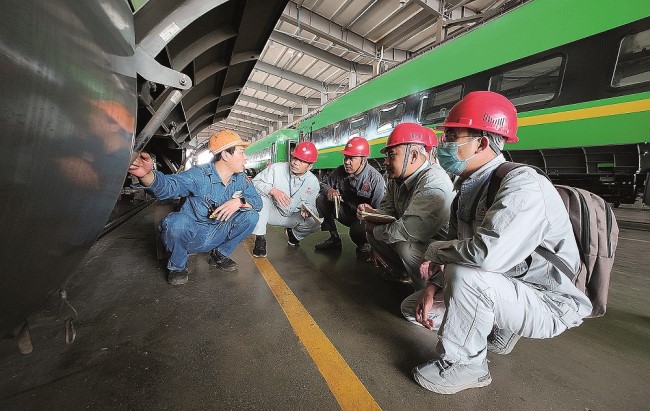
Lao students take part in an internship program at the China Railway Kunming Group in 2023. [Photo/China Daily]
Transforming landscape
Decades ago, Yunnan's development was limited by its mountainous landscape, with goods transported by mule caravans. Today high-speed trains traveling back and forth on railway bridges have transformed the region. Feng sees his mission as being to take railway education to Laos, where resources are scarce. "Laos, like Yunnan, relies on railways for progress. Teaching in Vientiane is my way of passing on this legacy and inspiring the next generation."
The "bridge" that needs to be built goes far beyond just connecting mountains.
The absence of specialized railway terminology in the Lao language poses a significant challenge in teaching, with technical terms often requiring direct translation between Chinese and Laos.
To tackle this problem, the academy has simultaneously begun to develop Lao railway course plans and Lao-language teaching materials for students.
The academy has compiled the first 10 bilingual Chinese-Lao textbooks to support future teaching at the Lao Railway Vocational Technical College and assist Chinese teachers conducting instructional activities in Laos. The second series of 13 bilingual textbooks are being prepared.
Liu Yajing, an expert in railway signaling at Kunming Railway Vocational and Technical College, said the school has specifically arranged Lao-language training courses for teachers involved in the aid projects.
"We've taken basic Lao-language lessons to facilitate smoother communication, bridging the gap between two peoples. Once we understand each other, our hearts grow closer."
Silivong Phouthachack, one of the 40 students who graduated and now teaching in Vientiane, said: "China hasn't just built a railway for us; it's given us the tools to build our own railway professionals. This reflects China's commitment to sharing achievements in railway development with the world.
"We have learned China's railway technology and talent cultivation system, and I'm really excited to be able to bring what I've learned back to Laos."
In August, 14 Lao nationals who successfully completed a self-driven test were awarded train driver certificates. This marks the first time Lao people have received this recognition, according to the Laotian Times.
As of September, there were 992 Lao employees working on the front lines of the railway, including 14 train drivers, according to the Laos-China Railway Company, which is responsible for operating the Lao section of the China-Laos Railway.